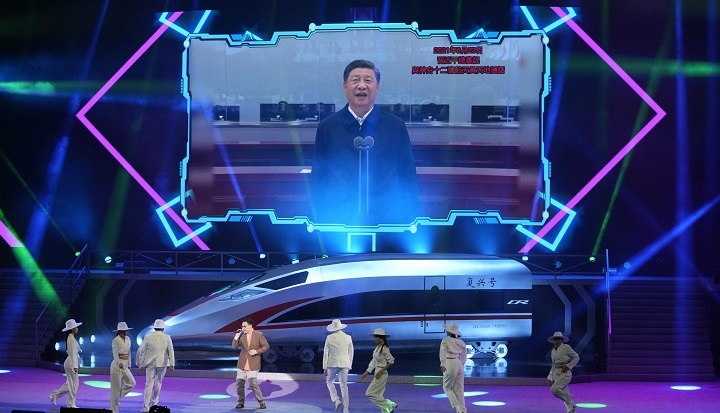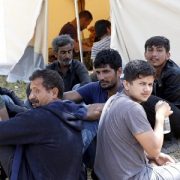
On the eve of China’s October 1 National Day celebrations, the Chinese Communist Party (CCP) expelled former vice-minister for public security Sun Lijun not for corruption but serious political crimes almost tantamount to something like an attempted coup. He was accused of “serious violations of discipline” and building cliques and cabals to take over a key government department.
Sun, apprehended about a year ago, is guilty of “overweening political ambitions” and “arbitrarily disagreeing with central policy guidelines,” the mighty party disciplinary committee CCDI wrote in a statement on its official website.
The ex vice minister had “created and spread political rumors, taken actions against others, wove a web of deceit to obtain political capital and … used unscrupulous means … to form gangs, cliques, and interest groups within the party and build his personal power,” the statement said thus implying he had gravely violated party centralism and allegiance to the top leadership.
“He formed a cabal to take control over a key department(s), seriously jeopardizing political security and party unity,” it said. Sun is also said to have been “harboring hugely inflated political ambitions” and having “evil political qualities.”
Meanwhile, the Chinese media reported that his former colleague, the ex-minister of justice and ex-head of the Public Security Bureau Fu Zhenghua, is being investigated for “serious violation of discipline and law,” according to a statement from the authorities.
Fu led the investigation into former security czar Zhou Yongkang, jailed in 2015. Zhou was a rival of president Xi Jinping and an ally of ex Chongqing party chief Bo Xilai, arrested in 2013. Bo’s and Zhou’s arrest helped to consolidate president Xi Jinping ascendence to power.
The news of Fu and Sun come weeks after their close ally, Peng Bo, a former top Chinese internet censor, was accused by the CCDI of disloyalty to the Party.
Peng, deputy chief of the Cyberspace Administration of China, was expelled from the Party in August. Peng and Fu crossed paths when the latter headed the Central 601 office, which in 1999 was in charge of the crackdown against the Falun Gong, ordered by ex-party chief Jiang Zemin. Peng was his deputy.
Fu is the fourth former deputy public security minister to be detained by the CCDI in recent years.
In 2016, Li Dongsheng, a former deputy national police chief and ally of ex-security tsar Zhou, was jailed for 15 years on corruption charges. Last year, the former head of the international policing agency Interpol, Meng Hongwei, was sentenced to 13 and a half years in jail for corruption.
The plot against Xi
The thinly veiled accusation is of plotting against Mr. Xi. But these officers are relatively junior to be scheming against the almost almighty Party leader. They must have had the support of some superiors. In the present party structure, they can likely be retired former leaders.
Mr. Xi is in an unprecedented and almost impossible position. Mao didn’t have any other senior leader lurking behind his back because he had won power through a war against his rival, nationalist generalissimo Chiang Kai-shek. Deng promptly eliminated his opponents, the “Gang of Four”, putting them on public trial and thus warning anybody else against trying anything funny.
Besides, none of his adversaries had his seniority and clout in handling party businesses. When Mr Jiang Zemin effectively came to power, after Deng’s demise, he had to deal with the mighty shadow of his rival Mr. Qiao Shi over his shoulder. Still, the Falun Gong protest was blamed on Mr. Qiao; he was sidelined, and allegedly soon after, he suffered from some kind of breakdown that impaired his faculties. All in all, Mr. Qiao’s power disappeared.
Mr. Hu Jintao had to live under Jiang’s cloud. Mr. Xi has been trying to cut off Jiang and all previous leaders, but there are simply too many. There are people from Mr. Hu’s generation, from Jiang’s generation, and even some rare survivors of Deng’s times. They have privileges, political access, a network of friends and allies, and shield one another.
To isolate them totally would deprive Mr. Xi of part of his own legitimacy, derived from being born into this elite. But to keep them around undermines Xi’s power. Jiang and Hu’s solution was to have former leaders consult for major and minor decisions. But the process was cumbersome, opaque, and led to the massive corruption that was halting the Chinese economy and that Mr. Xi tried to address.
Xi’s solution has been to have them live in a bubble, with money but no power, away from the limelight. But there are thousands of them, many relatively healthy and energetic, and in a society where personal bonds are vital, they still command loyalty from their former underlings. Sure, Mr. Xi is trying to cut these bonds, stressing the need to rule the country according to the unsentimental “laws” 法. Still, the switch is not easy in a place where personal connections have always been the backbone of survival in the face of a ruthless state. Neither is it now possible to physically eliminate or incarcerate all past leaders.
The traditional system put all imperial consorts and riotous princes under house arrest; the Turkish sultan would kill all his brothers upon his ascendancy to the throne. The method was cruel but rational. The supreme leader had to make sure nobody with clout would conspire behind his back.
Democratic systems do not remove this institutional risk but minimize it by making the political process transparent. You can openly argue against the present top leader, but you can’t secretly conspire against him; besides, leaders are practically ordinary citizens after retirement.
In that case, Mr. Xi should have an objective interest in making the system more transparent and democratic. His enemies could not hide, and the power struggle would be in the open.
Here there is another turn to China’s complex conundrum. If Mr. Xi were to try to solve his power issues by democratizing the political system, many in the Party would call him a “traitor.” The party structure is actually the big problem here. In many domestic and international issues, the interests of the Party trump those of the country.
For instance, would China benefit from a freely convertible currency and a freer market? Long-term, yes, but this would endanger the Party’s hold on power, as a possible financial crisis would shake the Party’s rigid grip. If the country were a democracy, the government would step down in case of financial turmoil, likely because of capital flight with a convertible currency. Another one would be chosen through an election.
Similarly, the interests of Party elders—keeping the bloated and ineffective privileged caste with its fingers in the cake of power—are against Mr. Xi who would like a more effective and responsive rule. In theory, comprehensive reform of the party structure would be necessary to have a clear “rule of law.” But some retired veterans are not actually interested in the state’s long-term interests but in recovering their half-lost dominance. If Mr. Xi doesn’t solve the issue, the many contradictions could make the system stall or explode in time.






Do you really want nothing standing in the way, of the US, the West or the Free World – whatever you call it – but in fact of the GAFAMs ?
You describe Xi’s situation very well and sympathetically: how he needs to combat cronyism, corruption, the dominance of a privileged caste and how he wants “to have a clear “rule of law.”
“[His opponents] have privileges, political access, a network of friends and allies, and shield one another.”
“[The prior] solution was to have former leaders consult for major and minor decisions. But the process was cumbersome, opaque, and led to the massive corruption that was halting the Chinese economy and that Mr. Xi tried to address. . . . they still command loyalty from their former underlings. Sure, Mr. Xi is trying to cut these bonds, stressing the need to rule the country according to the unsentimental “laws” 法.”
“Similarly, the interests of Party elders—keeping the bloated and ineffective privileged caste with its fingers in the cake of power—are against Mr. Xi who would like a more effective and responsive rule. ‘
Your suggestion below denominated a “democracy” fails to address precisely what has failed in the west:
“For instance, would China benefit from a freely convertible currency and a freer market? Long-term, yes, but this would endanger the Party’s hold on power, as a possible financial crisis would shake the Party’s rigid grip. If the country were a democracy, the government would step down in case of financial turmoil, likely because of capital flight with a convertible currency. Another one would be chosen through an election.”
The developed west has your democracy and a plague of regulatory capture. How would China avoid the financialization of its governance structure, such as in the US where a BlackRock has a team of officials embedded in the Biden regime and a financial elite managing all the US Federal Reserve branches? How did the US, with its “democracy,” handle the 2008 financial crisis? Did it allow the financial houses that verged on collapse to do so, or did it bail them out and even allow the failed houses to pay their managers’ bonuses? Does the US Congress control the military industrial complex, or is it the other way around?
Xi appears to recognize the threat to the Chinese public’s health, safety and welfare from unchecked financial power in the hands of his domestic dominant sector players and has proposed a “profound” shift for what is deemed the general welfare.
As you write: “Mr. Xi is in an unprecedented and almost impossible position.” You would have a very cogent thesis if you integrate the CCP’s efforts to rein in unchecked Chinese domestic financialization. If you did so you would identify the challenge China both faces internally and constitutes for its struggling western opponents.
Descrivi molto bene e con simpatia la situazione di Xi: come ha bisogno di combattere il clientelismo, la corruzione, il dominio di una casta privilegiata e come vuole “avere un chiaro “stato di diritto”.
“[I suoi avversari] hanno privilegi, accesso politico, una rete di amici e alleati e si proteggono a vicenda”.
“[La precedente] soluzione era che gli ex leader si consultassero per decisioni importanti e minori. Ma il processo era macchinoso, opaco e ha portato alla massiccia corruzione che stava arrestando l’economia cinese e che il signor Xi ha cercato di affrontare. . . . comandano ancora la lealtà dai loro ex sottoposti. Certo, il signor Xi sta cercando di tagliare questi legami, sottolineando la necessità di governare il paese secondo le “leggi” non sentimentali 法”.
“Allo stesso modo, gli interessi degli anziani del Partito – mantenere la casta privilegiata gonfia e inefficace con le dita nella torta del potere – sono contro il signor Xi che vorrebbe una regola più efficace e reattiva.’
Il tuo suggerimento di seguito denominato “democrazia” non affronta esattamente ciò che è fallito in Occidente:
“Ad esempio, la Cina trarrebbe beneficio da una valuta liberamente convertibile e da un mercato più libero? A lungo termine, sì, ma ciò metterebbe in pericolo la presa del potere del Partito, poiché una possibile crisi finanziaria scuoterebbe la rigida presa del Partito. Se il Paese fosse un democrazia, il governo si dimetterebbe in caso di turbolenze finanziarie, probabilmente a causa della fuga di capitali con una valuta convertibile. Un altro sarebbe scelto attraverso un’elezione”.
L’occidente sviluppato ha la tua democrazia e una piaga della cattura normativa. In che modo la Cina eviterebbe la finanziarizzazione della sua struttura di governance, come negli Stati Uniti dove una BlackRock ha una squadra di funzionari incorporati nel regime di Biden e un’élite finanziaria che gestisce tutte le filiali della Federal Reserve? In che modo gli Stati Uniti, con la loro “democrazia”, hanno gestito la crisi finanziaria del 2008? Ha permesso alle case finanziarie che erano sull’orlo del collasso di farlo, o le ha salvate e ha persino permesso alle case fallite di pagare i bonus dei loro manager? Il Congresso degli Stati Uniti controlla il complesso industriale militare o è il contrario?
Xi sembra riconoscere la minaccia alla salute, alla sicurezza e al benessere del pubblico cinese dal potere finanziario incontrollato nelle mani degli attori del settore dominante e ha proposto un cambiamento “profondo” per quello che è considerato il benessere generale.
Mentre scrivi: “Il signor Xi si trova in una posizione senza precedenti e quasi impossibile”. Avresti una tesi molto convincente se integrassi gli sforzi del PCC per frenare la finanziarizzazione interna cinese incontrollata. Se lo facessi, identificheresti la sfida che la Cina deve affrontare internamente e che costituisce per i suoi oppositori occidentali in difficoltà.
Xi appears to recognize the threat to the Chinese public’s health, safety and welfare from unchecked financial power in the hands of dominant sector players and has proposed a “profound” shift for what is deemed the general welfare.